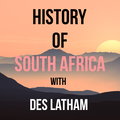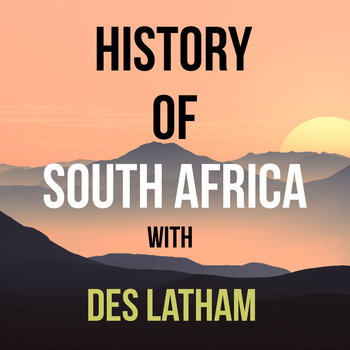
Episode 184 - A Fort Hare rout, “Vieux d’Afrique” Somerset and a British rethink about the role of chiefs in Africa
Loading player...
This is episode 184 and we’re picking up our story on old year’s eve 1850. Last episode, we heard how Cape Governor Harry Smith was holed up in Fort Cox, and the amaXhosa were in control of most of British Kaffraria - the 8th Frontier War was in full flow.
There were fears amongst the settlers that the war would spread as far as the Cape Colony, and the five thousand British troops stationed in southern Africa were spread as far as across the Orange River. What was also unclear was what was going on across the Kei, had the Gcaleka and Paramount chief Sandile decided to join in with Maqoma and Mlonjeni?
Also unclear was the situation in all the villages and towns, and what about the amaGqunukhwebe - were they going to remain neutral?
Missionary George Brown was still searching for his wife Janet and their infant — he didn’t know yet that she’d was on her way to Fort White and was safe. When we left off, Brown had been accosted close to his mission station at Iqibira, where Chief Maqoma who led the rebellion demanded he answer questions. We had also met Maqoma’s main translator who historians believe was Hermanus Matroos although he never formally introduced himself to Brown.
The reason why we’ve spent some time talking about Matroos is because he had convinced many in the Kat River Settlement Khoekhoe to join the uprising against the British. One raid too many by the redcoats into the Kat River, following years of being bad mouthed by the English Settlers led by the odious editor of the Grahamstown Journal Robert Godlonton, had pushed the Khoekhoe over the edge.
Mlanjeni the prophet had preached that an uprising against the British would succeed and so far he appeared to be 100 percent correct.
It was Sunday 29th December and on that very day, Colonel Henry Somerset — commanding officer of the frontier forces and commanding officer of the Cape Mounted Rifles, was on his horse heading towards Fort Cox.
He was trying to save Governor Sir Harry Smith who was besieged there - out although his dispatch riders had failed to pierce the amaXhosa warrior perimeter the previous night. Somerset was in his 60s, and quite a sight he was. Large handlebar moustache, was dapper in dress, but regularly almost useless in his actions.
This was the man upon which the entire British response dangled. Somerset’s father was Lord Charles, who had returned home after his stint as Governor of the Cape between 1814 and 1826 and died in 1837 at the age of 63.
His men loved him because he preferred sending them to the beach with a band than into the bracken with a rifle. By now he was seen as the beau ideal of a cavalry officer of the old regime.
One trooper wrote that he was
“…a fine looking old man, a regular Vieux d’Afrique…”
Or "Old Man of Africa"
And to make things worse, the defeat of the 91st was not the only bad news on Sunday 29th December 1850 — Somerset was to hear that Hermanus Matroos had convinced his fellow Khoekhoe and coloured brethren in the Kat River Settlement to join the amaXhosa uprising.
Attention turned quite swiftly to the Khoekhoe men of the Cape Mounted Rifles where some had already joined the Xhosa war.
There were fears amongst the settlers that the war would spread as far as the Cape Colony, and the five thousand British troops stationed in southern Africa were spread as far as across the Orange River. What was also unclear was what was going on across the Kei, had the Gcaleka and Paramount chief Sandile decided to join in with Maqoma and Mlonjeni?
Also unclear was the situation in all the villages and towns, and what about the amaGqunukhwebe - were they going to remain neutral?
Missionary George Brown was still searching for his wife Janet and their infant — he didn’t know yet that she’d was on her way to Fort White and was safe. When we left off, Brown had been accosted close to his mission station at Iqibira, where Chief Maqoma who led the rebellion demanded he answer questions. We had also met Maqoma’s main translator who historians believe was Hermanus Matroos although he never formally introduced himself to Brown.
The reason why we’ve spent some time talking about Matroos is because he had convinced many in the Kat River Settlement Khoekhoe to join the uprising against the British. One raid too many by the redcoats into the Kat River, following years of being bad mouthed by the English Settlers led by the odious editor of the Grahamstown Journal Robert Godlonton, had pushed the Khoekhoe over the edge.
Mlanjeni the prophet had preached that an uprising against the British would succeed and so far he appeared to be 100 percent correct.
It was Sunday 29th December and on that very day, Colonel Henry Somerset — commanding officer of the frontier forces and commanding officer of the Cape Mounted Rifles, was on his horse heading towards Fort Cox.
He was trying to save Governor Sir Harry Smith who was besieged there - out although his dispatch riders had failed to pierce the amaXhosa warrior perimeter the previous night. Somerset was in his 60s, and quite a sight he was. Large handlebar moustache, was dapper in dress, but regularly almost useless in his actions.
This was the man upon which the entire British response dangled. Somerset’s father was Lord Charles, who had returned home after his stint as Governor of the Cape between 1814 and 1826 and died in 1837 at the age of 63.
His men loved him because he preferred sending them to the beach with a band than into the bracken with a rifle. By now he was seen as the beau ideal of a cavalry officer of the old regime.
One trooper wrote that he was
“…a fine looking old man, a regular Vieux d’Afrique…”
Or "Old Man of Africa"
And to make things worse, the defeat of the 91st was not the only bad news on Sunday 29th December 1850 — Somerset was to hear that Hermanus Matroos had convinced his fellow Khoekhoe and coloured brethren in the Kat River Settlement to join the amaXhosa uprising.
Attention turned quite swiftly to the Khoekhoe men of the Cape Mounted Rifles where some had already joined the Xhosa war.

